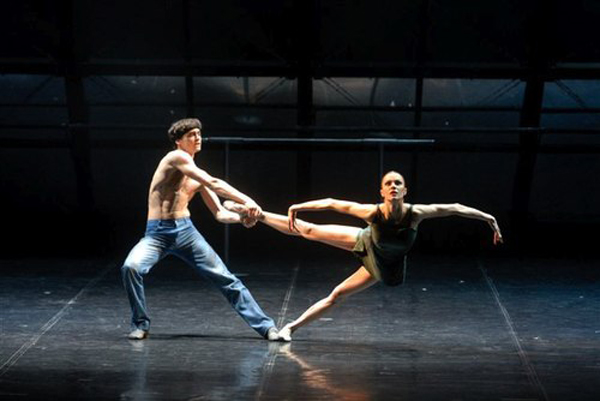
The Eifman Ballet of St. Petersburg will present a season of surprises at New York City Center, April 13–29. The engagement, part of the company’s world-wide 30th anniversary celebration, features the New York premiere of Boris Eifman’s “The Seagull,” based on the classic Chekhov play of the same name, and performances of some of the choreographer’s most beloved ballets. Highlights of the opening night gala include a world premiere by 28-year-old Russian choreographer Nikita Dmitrievsky and short takes from six signature Eifman ballets.
The season showcases four full-length ballets—three inspired by literary classics. “The Seagull” (2007), set to music by Sergei Rachmaninoff and Alexander Scriabin, was inspired by Chekhov’s classic story of unrequited love. Eifman, however, tells the story through the righteous eyes of a revolutionary, young choreographer compelled to challenge the conventions of classical tradition. Combining the tale of a passionate love
triangle with a story of artistic rebellion, the ballet, which incorporates elements of contemporary dance, includes a section of, yes!, hip hop.
Suggesting the glittering court of Catherine the Great, Eifman’s “Russian Hamlet” (2000) creates a parallel between the dramatic tale of the tortuous life of Paul, Catherine the Great’s only child, and Shakespeare’s self-doomed Danish prince. In his desire to
both parallel and distinguish between Shakespeare’s Hamlet and Catherine’s tragic son, Eifman does not hold to absolute fact, but rather recreates aspects of the tumultuous history. Paul’s desire for his mother’s death is revealed in vivid, phantasmagoric episodes in the ballet. Eifman chose scores by two German composers—Ludwig von Beethoven and Gustav Mahler—to express the different personalities, but shared heritage of Paul and Catherine.
Tolstoy’s “Anna Karenina” has been an ongoing fascination for Eifman. His interpretation of the Russian classic, which premiered in 2005, examines the love triangle between Anna, her husband Karenin, and her lover Vronsky. Boldly dramatic, and at times, erotic choreography is used to examine the psyche of Tolstoy’s characters as well as moral issues raised by their behavior. Many psychological, social and political questions are provoked by the ballet as it unfolds scene by scene to its accompanying Pyotr Tchaikovsky score: What are the consequences of a mother placing her romantic love above the interests of her children? Is it more important to maintain the illusion of harmony than to yield to passion?
“Red Giselle” (1997) is a fantasy based on the life of Russian ballerina Olga Spessivtseva and her identification with the tragic heroine of the 19th century ballet. Eifman examines Spessivtseva’s life, imagining her flight from Russia in 1923, her betrayal by her French lover, her exquisite brilliance as a dancer, and her ultimate tragic descent into madness. The music for the ballet is by Tchaikovsky, Alfred Schnitke and Georges Bizet.
The opening night gala on April 13 features Dmitrievsky’s “Cassandra”––the company’s first performance of a work by an outside artist. The music for “Cassandra” is by Gustav Holst. The evening will also include performances of sections from “Karamazovs” (1995), “Don Juan & Molière” (2001), “Don Quixote” (2002), “Who’s Who” (2003), “Anna Karenina,” and the first American performance of “Double Voice” (2006), set to music by Pink Floyd.
Eifman Ballet’s City Center engagement is presented by Ardani Artists and producer Sergei Danilian.
